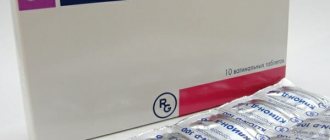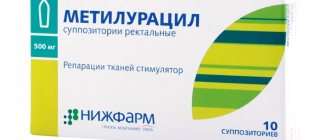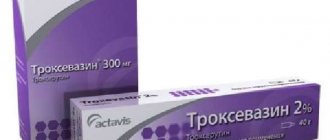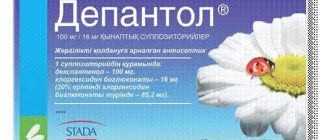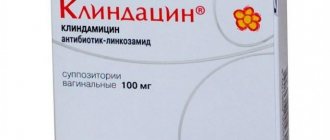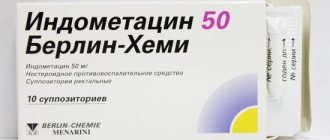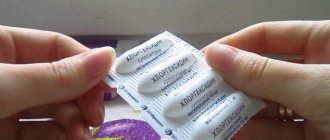Suppositories with ichthyol are a popular remedy in gynecology and proctology, because safe, natural, quickly relieves inflammation, normalizes blood flow, has an anesthetic effect and does not lead to side effects.
There are practically no contraindications, and if treatment is started in a timely manner at the initial stage, then in combination with other medications, suppositories will help patients avoid possible upcoming surgery and radical surgical intervention, which is fraught with negative consequences.
Composition of suppositories with ichthyol
The main active ingredient in the composition is ichthammol containing 200 mg per capsule.
Ichthyol is a dark-colored liquid with a rather pungent odor and excellent solubility in glycerin, ether, and alcohol.
Additional components in the candles:
- organic sulfur (10 and 5%);
- Witepsol for shaping candles.
The drug with a dense dark consistency has a distinct odor, so it is simply impossible to confuse it with other drugs.
What do ichthyol suppositories help with?
Ichthyol suppositories have a complex effect on the body: antiseptic, keratoplasty, analgesic, anti-inflammatory.
The drug helps well with:
- treatment of internal (external) hemorrhoids;
- inflammatory course in the pelvic area and hemorrhoids;
- cracks, wounds in the anus;
- prostatitis with chronic and acute course to stimulate spermatogenesis, eliminate possible risks of infertility, when there is a sharp decrease in reproductive functions in men.
Suppositories with the active component Ichthyol are often prescribed by doctors to women with damage to the vaginal mucosa, as well as for the treatment of diseases:
- colpitis;
- vaginosis;
- cervical erosion;
- inflammation of the ovaries and appendages.
The drug has a softening, wound-healing, tonic effect, therefore it can be used to treat the skin for healing and tissue regeneration in case of injuries, ulcers, burns.
Effect on the body
Ichthyol does not penetrate the bloodstream and has only a local effect. The duration of the effect was recorded for 22-24 hours.
The active substance in the suppositories promotes:
- increasing metabolism;
- increased blood flow and hot flashes in the pelvic area;
- suppression and relief of the inflammatory process;
- healing of wounds and cracks;
- increasing the tone and elasticity of vascular walls;
- softening and rejection of the epithelial affected upper layer of cells;
- removing microorganisms from the infected area;
- reducing pain due to irritating effects on nerve endings, thereby leading to loss of sensitivity.
Due to the venotonic effect, the suppositories normalize blood flow in the affected areas, relieve symptoms of inflammation, itching, and swelling.
When used vaginally for gynecological diseases, ichthyol is not absorbed into the bloodstream and has a gentle, mild effect on the epithelial cover of the vaginal mucosa, prevents the processes of rotting and fermentation, removes excess serous fluid, and promotes the healing of erosion.
In particular, suppositories can become indispensable in the treatment of burns, injuries, eczema, psoriasis, and dermatitis.
Impact on the body
Suppositories have anti-inflammatory, local analgesic, antimicrobial and keratoplastic effects, and reduce the pain that often accompanies this disease.
They normalize blood supply to the affected tissues, relieve swelling of the soft tissues of the prostate (which leads to stagnation of secretions) and have a slight phlebotonic effect and regulate vascular tone.
They also prevent the formation of tumor formations.
When the main component of the drug enters the rectum, it irritates the intestinal mucosa, resulting in increased blood supply to the pelvic organs. This has a positive effect on the normalization of metabolic processes in the tissues of the gland and relieves the inflammatory process, which leads to a speedy cure of the disease.
The difference from drugs for oral use is that suppositories do not irritate the stomach, kidneys and liver.
The use of suppositories is especially important in the chronic form of the pathological process. This helps prevent re-exacerbation and reduces the likelihood of developing undesirable consequences.
And in acute forms of inflammation it significantly reduces the duration of treatment.
Ichthammol reduces unpleasant symptoms of inflammation of the gland, and also has a positive effect on the entire urinary system. After a course of treatment, the performance of the prostate, bladder, ducts and blood supply to these organs improves.
Composition and release form
They have a torpedo-like shape and a dense texture. Candles are black-brown or dark brown in color with a specific smell. A white coating is allowed. Available in packs of 5 pieces. in contour cells; There are 2 cells in a cardboard package.
Contains: the main active ingredient is ichthammol from 10 to 20%, as well as additional components: water, emulsifier, solid fat Witepsol and supposir.
Application
Before using ichthyol suppositories for prostatitis, you need to empty your bowels with an enema or naturally. Next, thoroughly wash the anus and insert the suppository deep into the rectum so that it reaches the inflamed prostate gland. After administration, you need to lie on your side for at least 30 minutes. to avoid drug dislodgement.
It is recommended to take 1-2 suppositories every 24 hours, depending on the course of the disease and the severity of symptoms. The duration of therapy is determined for each case individually. The minimum course of treatment is 10 days, the maximum is a month.
The protective film is removed from the suppository and carefully inserted into the anus. This procedure must be performed quickly, since the candle can melt if held in your hands for a long time.
Experts do not recommend using ichthyol suppositories for prostatitis in combination therapy with other medications that contain iodine salts, heavy metals and alkaloids.
When interacting with these substances, it is possible that undesirable consequences may occur that will negatively affect the course of the disease and well-being.
This medicine is recommended by a specialist not only for complex therapy, but also for preventive purposes.
Contraindications and side effects
An absolute contraindication is considered intolerance and hypersensitivity to the components of the drug.
Sometimes local or general allergies may occur in the form of itching in the groin area and anus, swelling, rash and redness of the skin. The allergic reaction goes away after stopping use of the drug.
In people with allergic alertness of the body, in rare cases, nettle rashes, Quincke's edema and cough are observed.
Many men speak negatively about candles because of their specific smell. However, given the effectiveness of this drug, the unpleasant odor can be tolerated.
Overdose
To date, no cases of overdose have been observed.
Storage conditions
It should be stored in a dry place, protected from the sun, at a temperature below 20 degrees Celsius.
Best before date
2 years from date of manufacture. After the expiration date indicated on the package, do not use rectal suppositories.
Vacation conditions
Dispensed in retail pharmacies without a prescription form.
How to use?
It is advisable to use suppositories at night before bedtime to have a better effect and increase efficiency.
First you need to go to the toilet, empty your bowels, and give a cleansing enema if necessary.
Further:
- wash yourself, wash the anus with warm water without adding soap;
- dry lightly with a soft cloth;
- remove the candle from the packaging, remove the film;
- Use 2 fingers to gently guide into the rectum, lying on your side for convenience;
- lie down for a little up to 30 minutes, let the candle dissolve completely;
- after which you can get up and wash your hands with soap.
On a note! To increase the absorption of the active components, it is important that the intestines are completely emptied.
Indications for use
Ichthyol suppositories quickly relieve inflammation, relieve pain, do not penetrate into the blood, but actively act directly on the source of inflammation itself.
The drug does not have a negative effect on the stomach and can replace injections and tablets in full.
Candles are suitable for:
- arthritis;
- erysipelas;
- prostatitis in men;
- female diseases: colpitis, cervical erosion, ovarian cyst, endometriosis, inflammation of the appendages;
- constipation to liquefy stool;
- diseases of bacterial origin to provide anti-inflammatory, bactericidal effects.
The drug can be used as monotherapy or in combination with other drugs. The main thing is the advisability of using suppositories, taking into account the degree and stage of development of a particular pathology.
The use of suppositories may become relevant if there is an individual intolerance to other drugs or for older people, when with age constipation begins to plague them constantly, and the intestinal mucosa is damaged and needs to be nourished and restored.
Also, women during menopause often experience prolapse of the uterus and a hormonal surge is a concern.
The use of ichthyol suppositories is the right gentle solution in the fight against illnesses for unhindered trips to the toilet, when many different chronic diseases appear in people at once.
Release form and composition
Suppositories with ichthyol have many advantages that are incomparable with the similar effectiveness of similar medications. Suppositories with natural ingredients act locally, having a beneficial effect on the affected mucous membrane.
Ichthyol product is sold in the following forms:
Release form
- cream;
- ointment composition;
- rectal suppositories.
The active component (ichthyol) contained in this group of drugs has a positive effect in the treatment of various pathological processes, such as psoriasis with eczema, traumatic tissue damage, burns and other problems. When purchasing an ichthyol product, you should take into account the percentage of ichthyol present in the medicinal composition. Medicines are sold with 10 and 20 percent dosage compositions of ichthyol.
Ichthyol suppositories are sold without a prescription, but in order to begin antihemorrhoidal therapy, you should undergo a medical examination and receive recommendations on therapeutic measures for therapeutic purposes. The doctor will select the dosage of the ichthyol drug and adjust the duration of therapy.
Ichthyol suppositories in gynecology
It is important to understand that the main purpose of ichthyol suppositories is rectal use and the packaging itself states this. But the drug is widely used in gynecology.
In some cases, doctors allow vaginal use for diseases:
- salpingoophoritis with inflammation of the ovaries;
- endometritis;
- parametritis with inflammation of the fallopian tubes;
- cervicitis;
- cervical erosion;
- vaginosis
- pulpitis when a bacterial infection develops in the vagina in women;
- cystitis due to infection of the urethra;
- chronic nonspecific prostatitis in men with an inflammatory course in the prostate gland.
In particular, suppositories are recommended for the treatment of many urological diseases, when they have an advantage over the tablet form of other drugs and strong antibiotics with many contraindications.
Instructions for using suppositories vaginally
Even for gynecological purposes, suppositories should be used rectally up to 3 times a day, i.e. by insertion into the anus to increase the absorption of components.
You first need:
- give a cleansing enema;
- syringe and wash well without using soap;
- perform the procedure as quickly as possible until the candle melts;
- insert into the anus to a depth of a finger;
- remain in a horizontal position lying down for up to 30-40 minutes, until the drug is completely dissolved;
- After the procedure, wash your hands with soap.
On average, the course of treatment is 7 days, but can be extended taking into account the form and degree of development of the disease.
On a note! Ichthyol suppositories are intended for rectal use, so there is no need to insert suppositories into the vagina, otherwise irritation of the mucous membrane will occur. In case of incorrect use of the drug, it is necessary to perform genital hygiene using a pH neutral product.
Suppositories with ichthyol during pregnancy and breastfeeding
Often, in women in an interesting position, the organs of the peritoneum and pelvis begin to become inflamed.
There is concern about the possible penetration of infection through the placenta and a negative impact on the fetus.
Unfortunately, tests for the compatibility of ichthyol and pregnancy have not been carried out, so it is important to use suppositories only as prescribed by a doctor.
It is not recommended to self-medicate, despite the harmlessness of the drug and the absence of side effects.
In particular, when breastfeeding, it is important for women to discuss the treatment process with a specialist and possibly select alternative treatment options, or wait until the end of the lactation period.
It is worth understanding that when using the drug to treat internal (external) hemorrhoids, ichthyol particles can be absorbed into the blood when they come into contact with the rectal mucosa, and then penetrate into the milk.
It is difficult to predict how this may affect the baby’s health. When treating, for example, hemorrhoids, it is important to take into account the symptoms and the location of the hemorrhoids.
Perhaps the doctor will select suppositories and prescribe much more harmless remedies: Procto-glivenol, Hepatrombin, suppositories with sea buckthorn and calendula.
If necessary, suppositories can be used at the initial stage of hemorrhoids and for prophylactic purposes to avoid the possible development of hemorrhoids.
This is a common problem among women in labor, when it is during the period of breastfeeding that the question of the need to treat the problem arises.
Of course, suppositories are safe and can be used at any stage of pregnancy. After all, they will certainly cause significant damage.
IMPORTANT! If an allergic reaction, itching, burning, swelling, or pain occurs, use of the drug should be stopped and consult a doctor. Antihistamines may be prescribed.
Can it be used during menstruation?
Candles are a natural product.
Promotes:
- restoration of epithelial tissue in the mucosa;
- resorption and suppression of inflammatory infiltrate;
- eliminating the processes of fermentation and rotting.
This is an absolutely harmless composition, which, of course, can be used during menstruation and there will be no harm. However, the effect can be significantly reduced due to partial leaching of the drug together with blood discharge.
Of course, when injected into the anus, the drug acts locally and does not seem to have a negative effect on menstruation.
But the comfortable administration of suppositories may be impaired, and the body will not correctly perceive the medicinal components, i.e. the proper therapeutic effect will not occur. The quality of therapy will be significantly reduced.
In addition, when the candle melts, part of the medicine will begin to flow out, which means it will have a half-effective effect.
On a note! With heavy periods, the acidity in the vagina is greatly increased. This means that the active components of Ichthyol will begin to enter into a chemical reaction and ultimately lead to unpleasant sensations (burning, irritation, itching), i.e. will have the opposite effect.
When using suppositories, the monthly cycle may be disrupted, so it is not advisable to use them to avoid side effects.
Women may begin to panic, which is also undesirable at the time of the treatment course. Suppositories are designed to have an anti-inflammatory effect, but during menstruation they can, on the contrary, lead to an exacerbation of the underlying disease.
It is undesirable to use suppositories during menstruation and it is better to choose another, more favorable period for the treatment course..
Use by gynecologists and proctologists
Medical uses:
- How to use ichthyol suppositories in the treatment of gynecological diseases? Gynecologists prescribe this medicine for erosive lesions of the vaginal area and uterine cervix. The drug helps to cope with the appearance of characteristic pain and discomfort. Thanks to the active components of suppositories, the nutrition of mucous cells that have been damaged as a result of the development of diseases is stimulated. Ichthyol-based products help cope with the pathological nature of endometrial proliferation, which often occurs due to infection entering the female reproductive system. Suppositories also stop the development of incipient inflammation that develops inside the female genitourinary system. The active components of the suppository prevent the formation of adhesions inside the female genital organs, which also has a beneficial effect on health. Based on this, we can safely say that ichthyol preparations are indispensable in the treatment of diseases of the female reproductive system.
- In proctology, ichthyol suppositories are also quite common. As you know, hemorrhoids are a dangerous disease that requires immediate effective treatment. This is precisely the treatment provided by ichthyol contained in the appropriate suppositories. Using them rectally, it is possible to cope with many painful manifestations within a short time and bring the long-awaited recovery closer.
- In the treatment of diseases of a urological nature, these remedies are also quite effective. Inflammatory processes in hemorrhoids can be eliminated through the use of suppositories with ichthyol. Their active components promote the loss of nodes, which greatly facilitates the process of their treatment. Ichthyol restores nutrition to damaged intestinal cells, as a result of which hemorrhoids go away much faster.
- Ichthyol ointment for paraproctitis helps provide local anesthesia. Also, the use of these suppositories in the treatment weakens the intestinal spasms that occur, which facilitates the process of bowel movement. In addition, under the influence of a suppository with ichthyol, a significant softening of fecal stones occurs. As a result of subsequent peristaltic movements, the latter are easily removed naturally. In this case, there is no need to use an additional series of stimulations, except using ichthyol suppositories. The instructions for use also prescribe its use for local damage to the mucous membrane of the rectum. You just need to carefully insert the suppositories, trying to prevent the appearance of new cracks.
Treatment of chronic forms of male prostatitis often occurs with the use of ichthyol-based products.
Such urogenital ailments cannot be treated with many drugs, and ichthyol suppositories, on the contrary, are a clear confirmation of this. The described medications are effective for manifestations of cystitis or other diseases of an infectious nature, which are accompanied by numerous inflammatory processes with characteristic pain.
Treatment with ichthyol suppositories is often accompanied by taking additional medications. Such complex therapy has a more effective effect on the infectious focus and leads to faster recovery. The use of complex therapy is carried out taking into account the individual characteristics of each specific organism.
Ichthyol suppositories in proctology
Candles are widely used in proctology:
- relieve inflammation and spasms in the anus;
- eliminate pain, itching, burning even if hemorrhoidal cones fall out;
- reduce swelling;
- strengthens vascular walls;
- have a bactericidal and wound-healing effect on the rectal mucosa;
- nourish and restore damaged tissues;
- eliminate constipation and fecal obstruction;
- normalize peristalsis;
- soften fecal stones and allow them to come out naturally.
The drug ichthyol is indicated for use in hemorrhoids, paraproctitis, chronic prostatitis at the stage of remission or exacerbation.
Instructions for using suppositories rectally
Suppositories are often prescribed rectally to patients in the treatment of hemorrhoids to speed up the healing processes of cracks and wounds, and provide an antiseptic and analgesic effect.
Using candles is simple:
- wash your hands with soap;
- perform a cleansing enema, empty the intestines;
- insert the candle into the anus as deeply as possible and no more than 2 pieces per session.
Ichthyol relieves inflammation well, has an antiseptic and bactericidal effect, and is widely used in proctology and urology in the treatment of many diseases.
This is an excellent alternative for elderly and senile people, when it is not possible for any medical reasons to use, for example, strong antibiotics.
Ichthyol suppositories are safe, painless, convenient and easy to use. Helps restore the functions of the urethra, relieves attacks of cystitis.
If sick elderly people cannot use candles on their own, then it is worth providing assistance or suggesting or recommending how to act correctly.
Effective treatment of prostatitis
To treat prostatitis, ichthyol ointment is used in the form of suppositories. As a rule, treatment is complex. Ichthyol shows high effectiveness in the treatment of acute and chronic types of prostatitis.
The administration of ichthyol does not lose its expediency in the treatment of severe forms of prostatitis, when the patient’s reproductive functions are reduced. The active components of suppositories help to increase the process of spermogenesis, which minimizes the risk of infertility.
Recommendations for the use of suppositories for prostatitis:
- Preliminary bowel preparation involves douching.
- The suppository is administered rectally.
- The dosage of the suppository is prescribed by the doctor individually. This also applies to the course of treatment.
The presence of ichthyol helps minimize pain and inflammatory processes. At the same time, the process of toning blood vessels and accelerating blood circulation occurs. When using the drug, contraindications should be taken into account. Therefore, reading the instructions is mandatory.
Contraindications for use
There are no contraindications for the use of Ichthyol.
An exception may be:
- individual tolerance;
- hypersensitivity to some components;
- an allergic reaction, although it quickly goes away on its own as soon as the drug is stopped.
During pregnancy, no negative manifestations have been recorded after the use of ichthyol suppositories, but in order to avoid risk to the fetus, it is better to first consult a doctor before use.
During pregnancy
to expectant mothers
only if the consequences of hemorrhoidal pathology outweigh the risk of undesirable consequences. It is dangerous for a woman to engage in independent therapy during the period of bearing a baby, since the effect of the active components of medicinal compositions can negatively affect not only the health of the mother, but also the baby. The appointment of an antihemorrhoidal treatment regimen should be carried out by the treating proctologist together with the gynecologist who monitors the pregnancy.
The body of almost every pregnant woman is susceptible to hemorrhoidal pathology. The fact is that during the period of gestation, the female uterus grows and thereby creates increased pressure on the pelvic organs, disrupting blood circulation. Due to poor blood circulation, the veins in the anorectal area become enlarged and deformed - due to pressure on the vessels, hemorrhoidal inflammation begins, hemorrhoidal lumps form, which can fall into the lumen.
To avoid hemorrhoidal complications, women are advised to do a simple exercise every day - the knee-elbow position. During such a stand, the passage of urine in the ureters is restored, the processes of urinary emptying are improved, the outflow in the anorectal veins is normalized, and hemorrhoids are prevented.
If hemorrhoids develop during contractions or pushing during childbirth, doctors recommend daily washing with cool water after each bowel movement. Cool water can be diluted with chamomile infusion. In the absence of a positive therapeutic effect, the proctologist may prescribe ichthyol ointment or suppositories for local healing of injured mucous tissue. Ichthyol quickly eliminates disturbing symptoms with discomfort, itching and burning.
Side effects
There are also no side effects after using suppositories.
Rarely, but may occur:
- swelling;
- itching;
- burning;
- soreness;
- allergy.
It is not advisable to use ichthyol suppositories together with preparations containing iodine, ionic salts, or alkaloids.
If the substance gets into your mouth or eyes, rinse with running water as quickly as possible.
It is important to use Ichthyol for its intended purpose and correctly to achieve the best effect. For safety reasons, wash your hands with soap, avoiding getting particles on your face.
If unpleasant symptoms appear, the course of treatment should be suspended and an antihistamine should be taken.
What is ichthyol?
One of these agents is ichthyol, a substance with a very complex chemical name - ammonium bitumosulfonate.
It is popularly known as “ichthyol ointment.” The word “bitumen” in the chemical name is no coincidence. Ichthyol is an active substance formed after the distillation of oil shale. That is, in its final form, this product is close in composition to oil, hence the dark, almost black color of ichthyol. If you still remember school chemistry, then you know that oil consists of a large number of different mineral rocks, as well as kerogens, which were formed many millions of years ago from bacteria, algae and wood. Bitumen or oil as a medicine? This is something new, you might think. But in fact, ichthyol has been used in medicine since the 19th century, initially it was used to treat skin diseases, as well as rheumatism and gout. At the moment, this active substance is recognized in the European and American Pharmacopoeia and is widely used both in Russia and abroad.
In addition to the more well-known ichthyol ointment, there are also ichthyol suppositories. They are often used for gynecological diseases.
Dosage
Ichthyol suppositories are indicated exclusively rectally by introducing 1 suppository into the lumen of the rectum and no more than 2 times a day (day and evening).
The treatment course lasts 1-2 weeks, but extension is possible as prescribed by the doctor.
When treating hemorrhoids, it is permissible to increase the dose to provide an analgesic and disinfecting effect - 2 suppositories per 1 session, but only in severe inflammation.
Depending on the stage of the disease and the procedures taken, therapy may differ slightly. So, after removal of hemorrhoidal nodules, the course is extended to 2 weeks or up to 1 month.
But unpleasant symptoms usually disappear after 9-10 days from the start of using ichthyol suppositories.
Price in pharmacies in Moscow, St. Petersburg, regions
Ichthyol suppositories in gynecology (reviews in most cases are positive and they confirm the therapeutic effect of the drug) help eliminate various inflammations of the reproductive system.
You can buy the medicine without a doctor's prescription, but it is important to consult a specialist. The doctor will make a diagnosis and select the most effective treatment. Independent actions can harm your health. Prices in pharmacies in Moscow, St. Petersburg and in the regions range from 65 rubles. up to 93 rub.
Most women agree that ichthyol suppositories in gynecology help cope with various diseases of the genitourinary system. But doctors, taking into account patient reviews, recommend using complex treatment. In some situations, ichthyol suppositories alone are not enough to overcome the inflammatory process that affects the pelvic organs.
Article design: Vladimir the Great
Overdose
Cases of overdose with Ichthyol have not been identified. Even if the doses per day are significantly exceeded, suppositories with active natural ingredients in their composition are not able to have a negative effect and lead to side effects.
This drug is one of the safest among analogues and only in rare cases can it manifest itself:
- allergy;
- individual intolerance.
To relieve inflammation, suppositories are suitable for infants up to 1 year of age. They lead to special unforeseen reactions and consequences.
The history of the creation of the popular ichthyol ointment
Already in those years, the ointment was actively used as an anti-inflammatory and anti-burn agent in the treatment of hemorrhoidal fissures, furunculosis and all kinds of erosions, including in the field of gynecology. At all times, reviews of this medication have been extremely positive.
The drug is made by distilling certain shale rocks. The product was first produced in Germany in the port of Hamburg. Ammonia is added to the resulting ichthyol oil. Thanks to it, ichthyol acquires its unique smell.
Since the end of the 19th century, ichthyol has been used for various skin diseases - burns, furunculosis, in the treatment of hemorrhoids and fissures, and some gynecological diseases. Reviews have always been positive.
Ichthyol has an anti-inflammatory and anesthetic effect. The drug also improves blood flow in tissues, stimulates metabolic and regenerative processes.
Analogs of suppositories with ichthyol
Ichthyol suppositories are widely used in the treatment of many diseases in urology, proctology, and gynecology. Doctors often prescribe this effective and safe drug to patients.
The cheapest formulations with a similar effect include:
- Minisoft;
- Methylene blue;
- Fukortsin;
- Elekasol;
- Chlorophyllipt;
- Antiseptol;
- Diclofenac;
- Prostatilen;
- Methyluracil;
- Voltaren;
- Longidaza;
- Vishnevsky ointment;
- brilliant green;
- potassium permanganate;
- tea tree oil;
- glycerin (10%) for the purpose of treating hemorrhoids externally;
- Ichthammol, as a more expensive analogue, but helps well in the treatment of a nonspecific form of prostatitis, with the inflammatory process in hemorrhoids;
- suppositories with sea buckthorn for rectal and vaginal use.
Antiseptol
Tea tree oil
Diclofenac
Elekasol
Fukortsin
Glycerol
Chlorophyllipt
Longidaza
Potassium Permanganate
Methylene blue
Methyluracil
Candles with sea buckthorn
Prostatilen
Vishnevsky ointment
Voltaren
Diamond green
It is worth understanding that analogues have their own contraindications and side effects.
They also differ in dosage and duration of courses when used.
If you need to replace a medicine or select an analogue, it is advisable to first consult a doctor. Self-medication can be harmful and lead to the opposite negative effect.
Pharmacological properties
After the administration of an ichthyol suppository, the intestinal mucosa is irritated. At the level of reflexes, the process of blood circulation in the affected area is enhanced. The inflammatory process in the pelvic organs is eliminated due to improved material metabolism.
Ichthyol suppositories in gynecology (reviews in most cases are positive, due to the rapid action of the constituent components) have the following properties:
- eliminate swelling of affected tissues;
- reduce pain;
- dilate blood vessels and capillaries in the area of the inflammatory focus;
- reduce spasms;
- slow down the decay process;
- improve blood circulation;
- strengthen the walls of blood vessels;
- activate the process of regeneration of the affected epithelium.
Ichthyol suppositories act in such a way that the pathological infiltrate resolves in the area of the inflammatory focus. The medicine belongs to the group of antihemorrhoidal drugs that are applied topically (ATC code C05A X).
special instructions
It is appropriate to use suppositories together with antibiotics, regardless of the group. Ichthyol is not able to affect the absorption of other drugs.
If anti-inflammatory rectal suppositories are prescribed, then between doses you need to take a break of 15-20 minutes so that the activity of the active ingredients and the therapeutic effect do not decrease.
According to the instructions, it is not recommended to use candles:
- people prone to allergic reactions;
- pregnant women and during breastfeeding;
- together with preparations containing copper, lead, aluminum, zinc, alkaloids, iodine in the composition.
Pediatricians often prescribe suppositories to infants and young children. Cases of negative manifestations and side effects are extremely rare.
Interaction
Ichthyol suppositories can be combined with any medications. But, adding each new drug to the treatment of the disease, it is necessary to take into account its effect.
It should be understood that two effects of the same type can enhance each other’s effects. Therefore, it is better not to use products with a local irritating effect at the same time.
- The drug is carefully prescribed together with essential oil, digitalis .
- The simultaneous use of drugs containing salts of heavy metals to avoid unpredictable reactions.
Storage conditions and periods
Shelf life - 2 years. It is advisable to store it in the refrigerator or a cool place so that the drug does not melt and lose its medicinal properties.
Opened packaging cannot be stored and after use or a therapeutic course, it is better to throw away the remaining suppositories.
When purchasing, you should pay attention to the manufacturing date, as it may be different and less than 2 years old.
It is important to comply with the storage conditions of the drug, and in case of non-compliance, the medicinal qualities may be irretrievably lost. Candles can change in color, smell, consistency.

